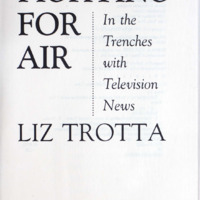-
Description
-
Journalist Liz Trotta recalls her career from the early days of broadcast news to the 1990s..
-
Identifier
-
365147
-
067167529X
-
Creator
-
Trotta, Liz
-
Source
-
Brian Lamb Booknotes Collection
-
Gift of Brian Lamb, 2011.
-
Catalog record
-
Language
-
eng
-
Date
-
1991
-
Program air date: August 18, 1991.
-
Publisher
-
Simon & Schuster
-
George Mason University. Libraries. Special Collections & Archives
-
Subject
-
"Trotta, Liz."
-
"Television broadcasting of news--United States."
-
"War correspondents--United States--Biography."
-
"Vietnam War, 1961-1975--Journalists--Biography."
-
"Women journalists--United States--Biography."
-
Relation
-
Original Booknotes interview
-
Rights
-
This work may be protected by copyright laws and is provided for educational and research purposes only. Any infringing use may be subject to disciplinary action and/or civil or criminal liability as provided by law. If you believe that you are the rights-holder and object to Mason’s use of this image, please contact speccoll@gmu.edu.
-
Text
-
Transcription of Annotations
Notes on front fly sheet: Hairpiece; Cronkite-65; Speedy Gaspard-90; Spence-91; Mudd Vietnam; AP's Geo. McArthur-97; *Treatment from liberal press-98; Tuckner; Shad-antiwar 109; Trang Bang--saw piece 20 yrs. later; Rod Steinman letter-123 where did you get them; Salary $25,521-1968; Liberal views on war 175; Teeth out 203; Now strike 205; Spivak -216. Notes and underlinings: TV news, two tours in Vietnam. Crews couldn't handle women on the job. March, 1968 Cronkite's on-air declaration for US pull-out jolts public/media; brought down a president. "Trotta is trouble"; does she have a sense of humor? Married men take it where they can get it. Pretended not to understand advances, protective coloration. Ron Steinman notes Trotta's arrival in Vietnam and complains Donghi spending too much time wet nursing her; told to treat like a correspondent, not like a woman. Craig J. Spence, ABC news. Press corps--early days selling physical courage, later "immoral war." Mudd refuses to cover war. George McArthur, AP, couldn't handle thought of a woman taking part of anything he did outside of a bed. Thought that she'd be mistreated by American military and Vietnamese because woman, but they treated her the best, news people threatened. Howard Tuckner wounded; on-camera closer in three takes; appeared spontaneous, but calculated attempt to play to the cheap seats. NY always looking for action, bang, bang. Satellites, if had more, war might have ended sooner. Jake Burn, had affair with in NY. Shad opposed war; private judgment stamped onto program. Gil's politics=left, Old Left, loathed war. Earl Browder candidate of Communist Party. Correspondents in field, producers, writers, executives at home --Vietnam=costly mistake. End of tour, 1969, swore never to return. Steinman letters about Trotta. Drive but problems. Press center brass saw newsmen as enemies of the Republic. Popularity, Trotta equal to propagandist Hanoi Hannah. Salary. Return to Vietnam, press corps ennui, futility, exasperation over war. Getting on air seemed to call for stories like: All Americans involved in war moral mutants, all S. Vietnamese corrupt, Hanoi troops fought nobly for a just cause. Charlie Mohr, New York Times. Don D'Amico. On tour Chancellor/Trotta differing view of war; Trotta applause after referring to Vietnam heroes--cool relations with Chancellor. Majority of news people liberal views, hostility to war. America sick of TV news bias. Nixon White House--media returns to "both sides of the story" reporting. Fight with campaign groupie results--groupie loses two teeth. National Organization for Women, one day strike. Today show turned on-air camera jobs to women--for the morning. Trotta took issue with the charade, refuses to do the news. Chancellor kills Trotta's series on women in prison. Chancellor against admitting women to Century Club. Sisterhood had limits. Ted Kennedy did not want to be on Meet the Press with Trotta. Trotta not allowed to mention Kopechne. Bob Mulholland tells Trotta to behave with Irwin Margolis at London Bureau. Trotta has reputation for temper, low tolerance for fools. Daily radio broadcasts in London. Felt stale from reporting withdrawal. Meets with new anchor Dan Rather, who warns her that Ed Joyce has issues with her--ability to breakaway. von Bülow trial overkill. 1985 all three network news divisions led by men with careers outside of journalism. Joyce claims Trotta difficult to work with. Age becomes an issue. Women with hard reporting/writing not in demand. Granada evening news A-lister demands Trotta's tapes; she refuses. Star correspondents fed news. New producers=video kittens. 1984 assigned to George McGovern. Despite loathing his 1972 positions and yappy delivery grew to like him and his hidden grace, subtle humor, old-fashioned decency. Never trust a man who wears boots--reference to Gary Hart. Deaths of college roommate Jeanie, American expat from London years and George Barrett. Robin Moore booed off of dais. Arnett, Faas, Adams, Mulligan, Esper, McArthur, Safer attend reunion of war correspondents. Safer filmed marines torching Cam Ne village--war resisters ignite. Harrison Salisbury. North Vietnam provided sources for casualties/bomb damage. William Burchett, Australian who covered Communist causes. Gloria Emerson. Tom Wicker admired Trotta's argument. Old assumptions remained, reporters overtaken by sense of mission.
 365147.pdf
365147.pdf